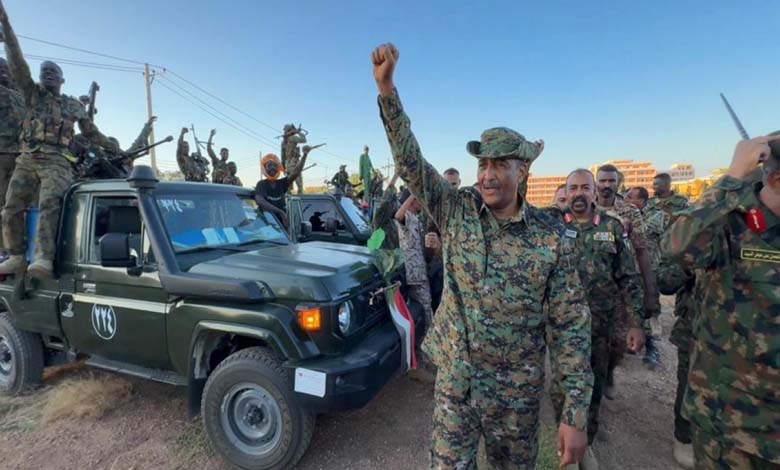Khartoum: Liberation or Genocide? Sudanese Army Accused of War Crimes

As the war in Sudan enters its second year, the country sinks deeper into darkness. The air is thick with the smell of death, smoke from fires, and the collapse of every international and regional attempt to bring a negotiated peace between the warring factions.
Since the conflict erupted in April 2023 between the Sudanese Army and the Rapid Support Forces (RSF), violence has only escalated. Key infrastructure in Khartoum has been reduced to ashes, with many buildings left in ruins from heavy gunfire.
-
The Muslim Brotherhood’s Congratulations to the Sudanese Army… A Move That Reveals the Group’s Role in Fueling the Conflict
-
Khartoum’s Liberation Exposes Alliances: Muslim Brotherhood’s Congratulatory Message to the Sudanese Army Raises Questions
The Battle for Khartoum
The RSF quickly seized control of most of Khartoum, forcing the army-backed government to relocate to Port Sudan on the Red Sea. From there, the government accused the RSF of looting and sabotage, claims the RSF repeatedly denied, blaming airstrikes by the Sudanese army or criminal gangs freed from prisons in army-held areas.
In March 2025, the Sudanese army officially announced it had retaken Khartoum. General Abdel Fattah al-Burhan declared “Khartoum is free” from inside the presidential palace.
-
The Muslim Brotherhood’s Congratulations to the Sudanese Army for the Liberation of Khartoum: A Reading of Political and Military Dimensions
-
The Sudanese Army Committed Horrific Field Executions in Khartoum
A Wave of Summary Executions
However, the “liberation” brought terror to many civilians trapped in the capital. Reports surfaced of grave human rights abuses, including racially motivated executions by army-allied forces. Social media has been flooded with videos showing civilians in plain clothes being executed on the spot.
The Emergency Lawyers Group, a human rights watchdog, stated it had verified many such incidents, condemning the actions as violations of humanitarian law.
-
Human Rights Organizations: Sudanese Army Involved in Summary Executions That Have Claimed Dozens of Civilian Lives
-
Under the Muslim Brotherhood’s Sponsorship Purges Cracks and Serious Violations within the Sudanese Army
Activist and lawyer Rahab Mubarak Sayed Ahmed confirmed that neighborhoods like Kalakla, Al-Garif West, and central Khartoum saw a wave of executions carried out under the pretext of collaboration with the RSF. She stated that many civilians were detained and executed without trial.
She directly blamed the Sudan Shield Forces, the Al-Baraa Ibn Malik Brigades, and special units of the intelligence services for these extrajudicial killings. She also noted that the absence of law enforcement on the ground allowed impunity and left civilians vulnerable to accusations and deadly consequences.
-
Sudanese Army’s Threats to its Neighbors: An Internal Distraction Signaling Regional Dangers
-
A report highlights the crimes and atrocities committed in Sudanese Army and Muslim Brotherhood prisons
A Pattern Repeated in Al-Jazirah State
Similar atrocities occurred earlier in Wad Madani, capital of Al-Jazira State, in January 2025. On January 9, Sudan Shield Forces allegedly killed civilians, including children burned alive in their homes, as documented by the legal committee of the “Taqaddum” coalition.
In March 2025, the grassroots Kanabi Conference accused army forces of burning five villages in Al-Kamlin locality, claiming residents were aiding the RSF. Villages such as Kombo Ronqa, Kombo Hala Four, Zalingei, Al-Burhan, and Talaba were reportedly destroyed.
-
Arrests, Executions, and Violations… What Is Happening Inside Sudanese Army Prisons
-
Sudanese Army’s Military Gains Undermine Chances of a Peaceful Resolution to the Crisis
International Backlash and Local Condemnation
The atrocities in Al-Jazirah prompted international outrage. In January 2025, the U.S. Treasury Department sanctioned General al-Burhan. Then-Secretary of State Antony Blinken stated: “Under al-Burhan’s leadership, the Sudanese Armed Forces continued to commit atrocities, including targeting civilians, destroying infrastructure, and executing non-combatants.”
Domestically, numerous political figures and civil society activists condemned the army’s conduct in Khartoum.
-
The Sudanese Army and the Use of Chemical Weapons: Recent War Violations and Humanitarian Impact
-
Sudanese Army Violations Against Civilians: War Crimes Threatening the Country’s Future
Bakri Al-Jak, spokesperson for the civil democratic alliance “Samoud”, stated: “The state’s collapse, lawlessness, and the trauma caused by RSF atrocities have led the army and its allied militias to believe they can act with impunity against anyone suspected of RSF links.”
Political analyst and democracy advocate Wail Mahjoub added: “These revenge killings based on unverified claims must not be condoned. The Sudanese Armed Forces must be held accountable under international humanitarian law and the Geneva Conventions of 1949, including the rights of prisoners of war and the protection of civilians.”











